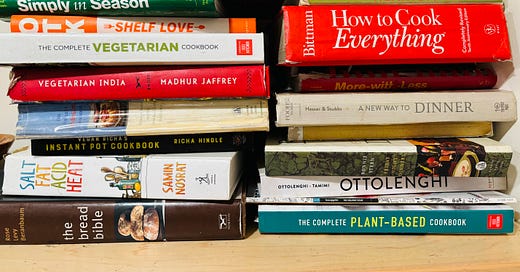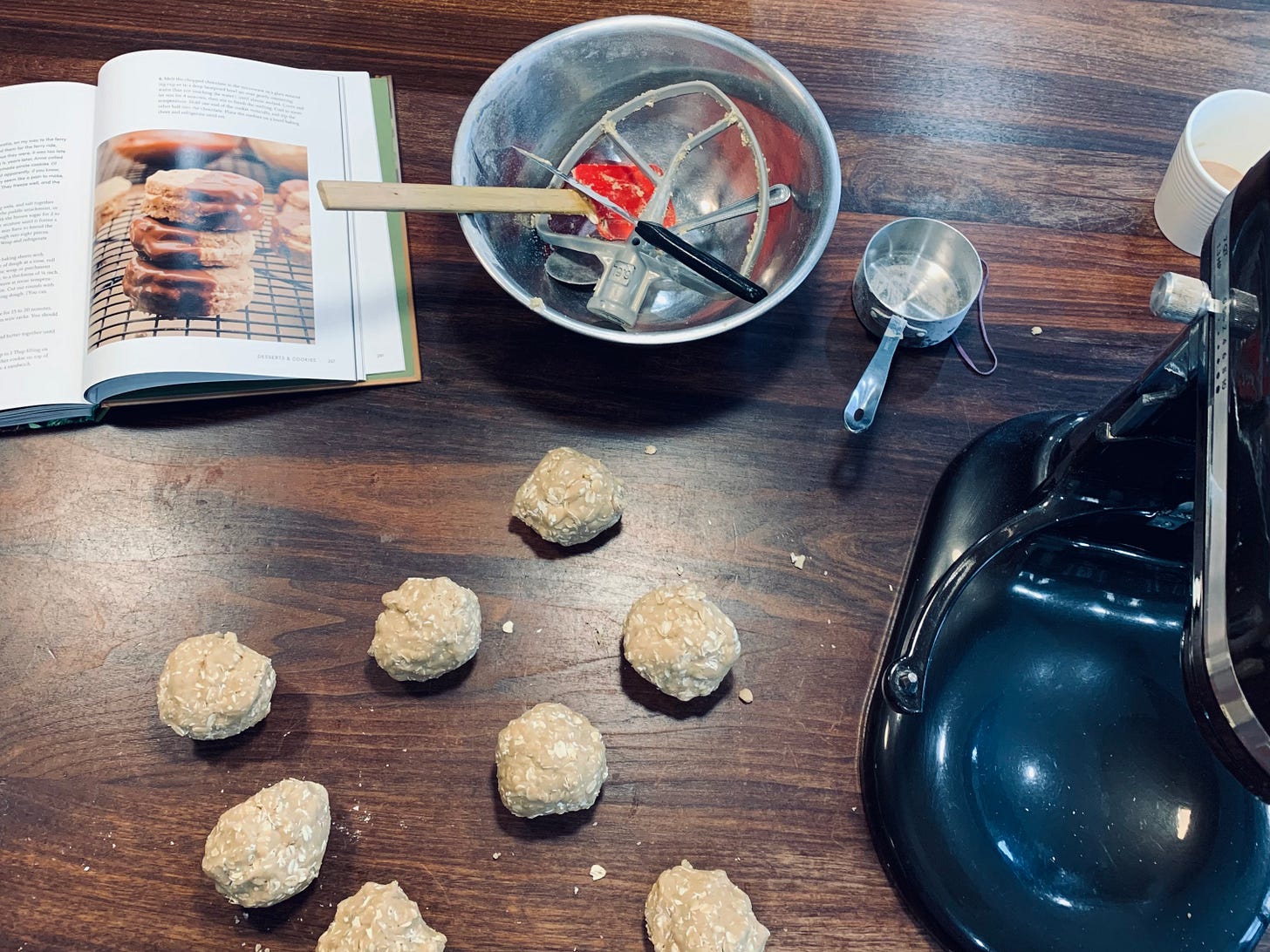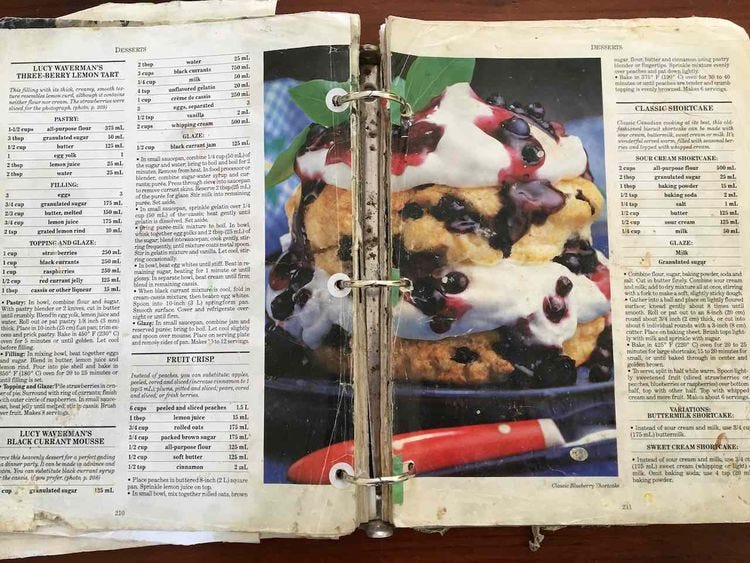Apparently, I own 34 cookbooks. My son recently counted them for a graphing project at school. As he graphed them against other items in our home (bicycles, violins, hamsters—only one of the latter, thankfully), I got thinking about how that collection of books has played a fundamental role in feeding my family for nearly 15 years.
I’m deeply attached to my cookbooks. Despite having access to an entire Internet of recipes and cooking apps, I don’t want to Google something for dinner. I much prefer the repetitive, almost meditative, act of pulling a book off the shelf, flipping to the index, and looking for ways to use the ingredients I have on hand. It means that I make some recipes over and over again, but my kids love it. They want food that is both delicious and familiar. And, come to think of it, so do I.
Food tastes better when it has meaning. And meaning is imbued through repetition. Kids grow up associating key dishes and flavours with their family home. I like to think that it gives them something tangible to take away with them when they grow and leave home. Those flavours can always be recreated elsewhere, and they’ll never fail to transport them back to the place where they were raised. Certain foods do that for me, like my dad’s blueberry pancakes with maple syrup, and my mom’s minestrone soup with tea biscuits, and my grandma’s apple pie.
In a recent piece for the Globe and Mail, Canadian writer Michael Harris wrote about how impersonal online recipes and digital cooking apps untether us from a personal past:
“The food we prepare today seems to arrive from nowhere, with no familial strings at all. It’s often more nutritious than the fare we grew up with, and it may even be more ‘to our taste,’ but breakfast, lunch and dinner are meant to fuel more than our bodies. Have we wrought for ourselves a spiritual malnourishment?”
Harris makes a good point. Food belongs within a context, and cookbooks provide that. Random digital recipes feel like recipes without a home. I suppose you could give them a home by making them part of an established repertoire, but I’ve found it is hard to keep track of online recipes. They get lost easily and forgotten, whereas recipes in a cookbook (or better yet, a box of handwritten recipe cards) are like encountering old friends. It’s always a promising reunion.
Cookbooks make the act of cooking more comfortable. I know my books intimately at this point. I know what to expect after years of interacting with each one. There are pencilled stars and checkmarks beside the recipe titles, where I’ve written things like “Great!” or “Awful!”
There are notes in the margins that would make food writer Bee Wilson proud. She’s a proponent of marking up recipes to provide context, background information, observations, and advice for future cooks. She describes it as a “never-ending kitchen conversation,” and it’s something that Internet recipes can never rival. Her writing taught me to think of cookbooks as workbooks, not untouchable treasures.
I believe, too, that repeating recipes and becoming familiar with them promotes kitchen mastery. The more times you make something, the better you get at it—and the more confident you’ll become at diagnosing problems, substituting ingredients, and eventually adding your own touch to make it your own.
If every recipe is being made for the first time, I suspect you’d never lose that unsure feeling of being a novice, not quite knowing what to expect from it. And let’s be honest—there are so many bad recipes out there. You could be setting yourself up for failure. Do yourself a favour and pare them down by choosing a published book with a good reputation, instead of a random food blog.
My cookbook collection runs the gamut from ancient to new. It’s always evolving, as I add new ones and ditch under-utilized ones. Some will never go, like the original 1987 Canadian Living cookbook that my mother used nightly throughout my childhood, its pages now in a binder, covered with actual food stains, which is simultaneously gross and fascinating. Newer ones include a few America’s Test Kitchen books that were sent to me to review for my last job, and Ottolenghi’s Shelf Love, which I am obsessed with.
Of course, being part of a southern Ontario Mennonite family, my collection wouldn’t be complete with the More With Less cookbook, published in 1976. As I wrote for Treehugger years ago, “The recipes are simple, hearty, and budget-friendly. Some are humorously outdated, but it's the perfect book for those last-minute dinners when all I've got is a bunch of beans, some sprouting potatoes, and a few limp veggies.”
I love Madhur Jaffrey’s Vegetarian India, and I have a Food52 baking book that my sons whip out regularly to make desserts. I don’t know what I’d do without The Bread Bible, which initiated my love of slow-rise hearth breads, and Bittman’s How to Cook Everything, a wedding gift from former colleague Lloyd Alter (of Carbon Upfront) that has seen heavy use over the years.
If it were just me and a kitchen full of ingredients, I’d feel lost. But the presence of my (analog) cookbooks transforms that sense of overwhelm into a sense of possibility and, eventually, of accomplishment. We’re a team, those books and I, and together we turn food into delicious, nourishing meals that my children ask for over and over again.
You Might Also Like:
How to Make Cooking More Efficient
Family Day Bagels
My Week in Food
On Subscriptions:
The Analog Family is a reader-supported newsletter. If you value my work, please consider upgrading to a paid subscription for only CAD$7/month (the cost of one large fancy latte!) or CAD$70/year. Your support keeps this project growing and is hugely appreciated.







My cookbook collection is one of my great joys! I usually ask for a new cookbook every Christmas and one of my favorite traditions is grabbing a few off the shelves in those quiet weeks of late December and early January and re-immersing myself in recipes (and the stories behind them) to invigorate a new year in the kitchen!
I also enjoy actually reading my cookbooks, Delia Smith is a favourite although I don't make a whole lot of her recipes - I did really like her cooking show years ago. And I know I am not the only one who dislikes getting a recipe off a website because you have to read through a novel about the ingredients and the prep and the tools needed etc etc while pop up videos auto play and banner ads appear at regular intervals!